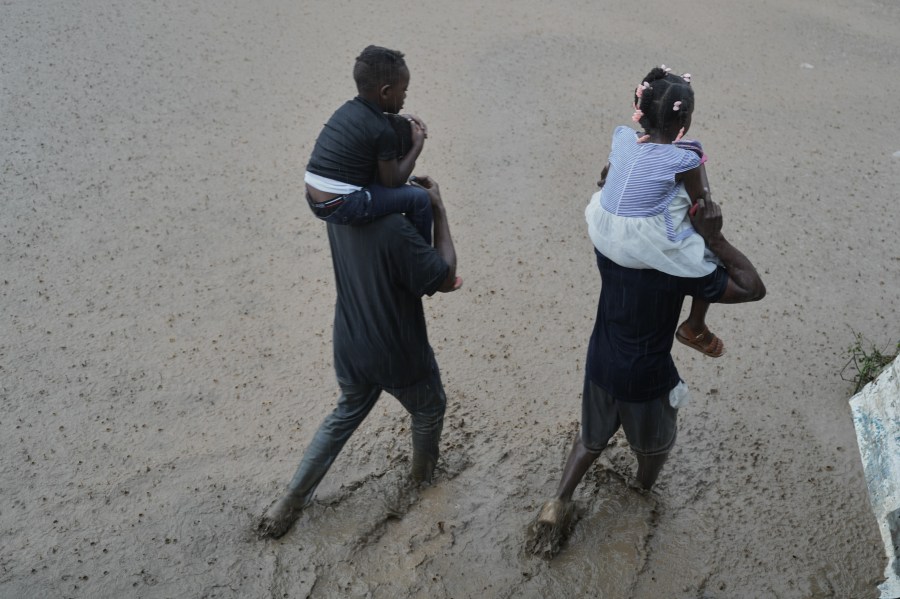Top Stories
Climate Change Fuels Hurricane Melissa’s Devastation, Analysis Reveals

UPDATE: A new analysis confirms that human-caused climate change significantly amplified the destruction caused by Hurricane Melissa, which recently wreaked havoc across the Caribbean. The report, released by the World Weather Attribution (WWA) on Thursday, highlights alarming increases in wind speeds and rainfall intensity directly linked to climate change.
Hurricane Melissa, one of the strongest Atlantic hurricanes to make landfall, devastated areas including Jamaica, Haiti, the Dominican Republic, and Cuba, resulting in dozens of fatalities and widespread damage. Homes lost roofs, hospitals faced severe damage, roads were blocked by landslides, and agricultural fields were decimated.
The WWA’s rapid analysis reveals that climate change increased Melissa’s maximum wind speeds by an astonishing 7% and intensified rainfall by 16%. Furthermore, the temperature and humidity conditions that fueled the storm were six times more likely due to climate change compared to a pre-industrial world.
“Warmer ocean temperatures are effectively the engine that drives a hurricane,” said Theodore Keeping, a climate scientist at WWA. The report noted that ocean temperatures along Melissa’s path were approximately 1.4°C (2.5°F) warmer than historical averages.
Melissa is the fourth storm this year to experience rapid intensification, a phenomenon defined by a minimum increase of 30 knots (about 35 mph or 56 kph) in maximum sustained winds within a 24-hour period. “In a pre-industrial climate, a hurricane this rare would have had wind speeds about 10 mph (about 16 kph) less extreme,” Keeping added. The connection between increased wind speeds and economic damage is critical, suggesting that if winds had been slower, the destruction could have been significantly less.
Experts are increasingly linking the rapid intensification of hurricanes like Melissa to human-induced climate change. The greenhouse gases released by human activity, particularly carbon dioxide, allow the atmosphere to retain more moisture and raise ocean temperatures, effectively providing hurricanes with more energy and moisture. “It’s like taking a sponge and wringing it out, with climate change making that sponge even larger,” explained Brian Tang, a professor of atmospheric science at the University at Albany.
Rapid attribution analyses like the one conducted by WWA provide urgent insights shortly after catastrophic weather events, filling a critical need for understanding climate change impacts. Andrew Dessler, a professor of atmospheric sciences at Texas A&M University, emphasized that the findings align with existing research on climate change and tropical storms. “This is completely consistent with our expectation of what’s going to happen in the future,” he stated.
The implications of Hurricane Melissa’s intensity are concerning. As climate change continues to escalate, storms of this magnitude may become more frequent, raising the stakes for vulnerable communities in their path. As Dessler noted, “One of the scariest aspects of Melissa was the storm’s peak sustained winds of 185 mph (about 298 kph). That’s pretty rare, and if this is a harbinger of the future, it’s not good.”
As the world grapples with the accelerating impacts of climate change, the devastation wrought by Hurricane Melissa serves as a stark reminder of the urgent need for action. The analysis underscores the critical intersection of human activity and extreme weather, emphasizing that immediate measures are necessary to mitigate future disasters.
Stay tuned for more updates on this developing story as the impacts of Hurricane Melissa continue to unfold across the region.
-

 Politics1 week ago
Politics1 week agoHamas Chief Stresses Disarmament Tied to Occupation’s End
-

 Science3 weeks ago
Science3 weeks agoResearchers Challenge 200-Year-Old Physics Principle with Atomic Engines
-

 Science1 week ago
Science1 week agoOhio State Study Uncovers Brain Connectivity and Function Links
-

 Entertainment1 week ago
Entertainment1 week agoMegan Thee Stallion Exposes Alleged Online Attack by Bots
-

 Top Stories1 week ago
Top Stories1 week agoFederal Agents Detain Driver in Addison; Protests Erupt Immediately
-

 Entertainment2 weeks ago
Entertainment2 weeks agoSyracuse Stage Delivers Lively Adaptation of ‘The 39 Steps’
-

 Top Stories1 week ago
Top Stories1 week agoOrioles Hire Craig Albernaz as New Manager Amid Rebuild
-

 World3 weeks ago
World3 weeks agoGlobal Military Spending: Air Forces Ranked by Budget and Capability
-

 Politics3 weeks ago
Politics3 weeks agoNHP Foundation Secures Land for 158 Affordable Apartments in Denver
-

 Top Stories2 weeks ago
Top Stories2 weeks agoWill Smith Powers Dodgers to World Series Tie with Key Homer
-

 Lifestyle2 weeks ago
Lifestyle2 weeks agoTrump’s Push to Censor National Parks Faces Growing Backlash
-

 Business1 week ago
Business1 week agoHome Depot Slashes Prices on Halloween Favorites Up to 75%








